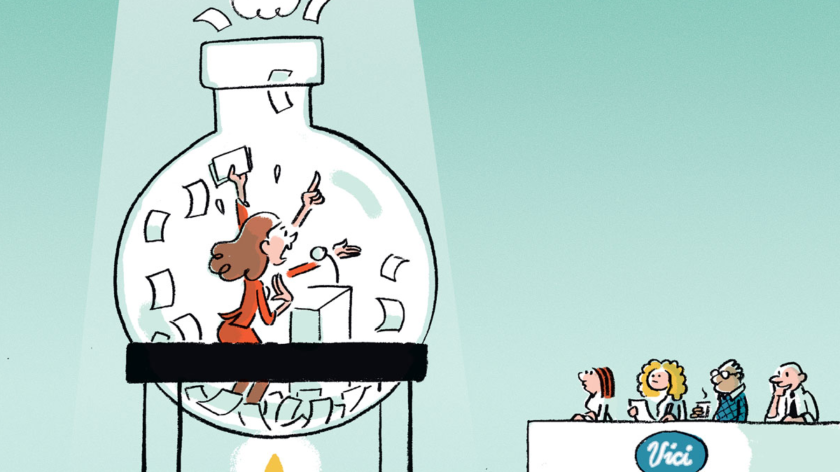NWO hack inconvenient for Vidi applicants
-
 Illustratie: Roel Venderbosch
Illustratie: Roel Venderbosch
Grant provider NWO has been struggling with a hack for several weeks now. As a result, researchers are unable to submit applications. This is particularly bad timing for Vidi applicants, who should have defended their proposals in front of a committee of experts this month.
Grant provider NWO has been struggling with a hack for several weeks now. As a result, researchers are unable to submit applications. This is particularly bad timing for Vidi applicants, who should have defended their proposals in front of a committee of experts this month.
‘Yes, you can call then,’ says researcher Vitória Piai of the Donders Institute on Tuesday afternoon. ‘I was supposed to have my Vidi interview now, but it was rescheduled.’ She laughs, but she’s been preparing for this interview for weeks and should be defending her research proposal in front of a panel of experts. A positive outcome would have resulted in an 800,000 euro grant from the Netherlands Organisation for Scientific Research (NWO).
Unfortunately, the interview was cancelled two weeks ago. The NWO, the national research council that annually awards academic grants worth almost a billion euros total on behalf of the Dutch government, was recently hacked. Last month, the hacker collective known as DoppelPaymer launched a ransomware attack on the NWO servers. The NWO principally refuses to pay the ransom, unlike Maastricht University, which was the victim of a similar attack just over a year ago.
Downtime
The NWO has virtually ground to a halt since the attack. While the grant provider can’t be reached by e-mail, it’s doing its best to communicate with researchers through its website. The agency published an FAQ about the hack and posts regular updates with the latest information.
As a result of the hack, all grant procedures have been put on hold. Researchers who were waiting to find out whether their Open Competition application had been approved now have to wait even longer. It’s also not possible to submit change requests for ongoing projects.
Disappointing
The hardest hit may be the researchers in the middle of the Vidi grant process, such as Piai and three other researchers Vox spoke with. At this point, the interview should have been about their plans for the future. For many researchers, the Vidi grant is important as it allows them to set up their own research group. It also opens doors to a permanent position. The Vidi is also highly competitive. Less than a sixth of the more than 500 applicants in 2019 were approved.
The interview is the last step in the months-long Vidi process (the submission deadline for proposals was October 2020). External reviewers assessed the submitted plans in previous stages, during which two-thirds of the competition is phased out. Every month that makes this lengthy procedure even longer is one too many.
No reply
‘I just want to know where I stand,’ says brain researcher Piai. She heard about the NWO hack from the university’s grant support service — she never received a letter or an e-mail that her interview was cancelled.
Piai finds it hard to wrap her head around the fact that her interview cannot take place. ‘You work so hard towards this moment, doing mock interviews with colleagues,’ she explains. ‘I didn’t cancel the mock interview last week, even though I knew the real thing wouldn’t go through. We’d already prepared for it.’ The tension and excitement she would have otherwise felt, wasn’t there. ‘Maybe the NWO can just scrap the whole interview round this year? The proposals have already been evaluated by the experts.’
‘At least I still have the e-mail saying I made it to the interview round’
Piai’s colleague Linda Geerligs also had a date for her mock interview when she heard about the NWO hack. ‘It’s so disappointing,’ she says over the phone, ‘but at least I still have the e-mail saying I made it to the interview round.’ If that information gets erased from the NWO system, she’ll still have proof.
Slow start
When and if the Vidi interviews will be rescheduled is still unknown. According to spokesperson Poppy Savenije, the NWO is working hard to restore everything from backups. ‘It’s a complex process,’ she says. The NWO hopes to slowly start back up again after next week. There will probably be more clarity about the application schedules this week.
Researchers should not suffer from shifting deadlines, says Savenije. Some grants have a hard application deadline of three years (Veni) or eight years (Vidi) after the PhD date. ‘In these cases, it makes sense to postpone. We want to give everyone the same opportunities. In fact, getting more time to work on the grant application may even benefit some researchers.’
Piai decided to do something totally different on her original interview day. ‘I called a friend and we went for a long walk together to get rid of all that built-up tension.’




